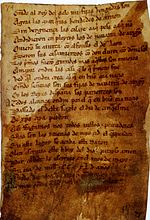Search results
Appearance
The page "Function verb" does not exist. You can create a draft and submit it for review or request that a redirect be created, but consider checking the search results below to see whether the topic is already covered.
- The verbs do and have can also function as full verbs or as light verbs, which can be a source of confusion about their status. The modal verbs (can...22 KB (2,688 words) - 07:42, 3 June 2024
- Japanese conjugation (redirect from Te form of Japanese verb)Japanese verbs, like the verbs of many other languages, can be morphologically modified to change their meaning or grammatical function – a process known...129 KB (6,447 words) - 08:47, 7 May 2024
- transitive verb or a finite intransitive verb can function as the root of an independent clause. Finite verbs are distinguished from non-finite verbs such as...11 KB (1,432 words) - 19:27, 2 April 2024
- linguistics a lexical verb or main verb is a member of an open class of verbs that includes all verbs except auxiliary verbs. Lexical verbs typically express...2 KB (149 words) - 14:19, 9 August 2021
- Copula (linguistics) (redirect from Be (verb))used to refer to such principal verbs, it may also be used for a wider group of verbs with similar potential functions (like become, get, feel and seem...69 KB (7,628 words) - 20:13, 14 May 2024
- Vietnamese grammar (section Functive verbs)detailed below. Attention is paid to both form and function. Nouns can be distinguished from verbs syntactically in that the copula là "to be" may precede...58 KB (6,111 words) - 06:03, 9 June 2024
- hat is my father (it behaves as a verb in taking an object, a hat, although the resulting phrase wearing a hat functions like an attributive adjective in...8 KB (1,119 words) - 04:49, 4 April 2024
- traditional grammar of Modern English, a phrasal verb typically constitutes a single semantic unit consisting of a verb followed by a particle (examples: turn down...25 KB (3,103 words) - 12:55, 7 June 2024
- would, ought to, used to and dare. Modal verbs have a wide variety of communicative functions, but these functions can generally be related to a scale ranging...13 KB (1,487 words) - 00:51, 26 April 2024
- In linguistic typology, a subject–object–verb (SOV) language is one in which the subject, object, and verb of a sentence always or usually appear in that...42 KB (5,539 words) - 21:55, 3 June 2024
- regular verb is any verb whose conjugation follows the typical pattern, or one of the typical patterns, of the language to which it belongs. A verb whose...18 KB (2,546 words) - 04:15, 31 May 2024
- characters. Proto-Indo-European verbs reflect a complex system of morphology, more complicated than the substantive, with verbs categorized according to their...82 KB (7,772 words) - 08:50, 2 June 2024
- Common verbs in English that can function as light verbs are do, give, have, make, get, and take. Other names for light verb include delexical verb, vector...23 KB (2,435 words) - 03:06, 25 February 2024
- A nonfinite verb, in contrast to a finite verb, is a derivative form of a verb that lacks inflection (conjugation) for number or person. In the English...13 KB (1,263 words) - 02:49, 26 May 2024
- compound verb or complex predicate is a multi-word compound that functions as a single verb. One component of the compound is a light verb or vector...20 KB (2,796 words) - 22:44, 19 December 2023
- All Indo-European verbs that passed into Germanic as functioning verbs were strong, apart from the small group of irregular verbs discussed below. The...29 KB (2,932 words) - 19:25, 10 June 2024
- Participle (redirect from Participle verb)partaking'; abbr. PTCP) is a nonfinite verb form that has some of the characteristics and functions of both verbs and adjectives. More narrowly, participle...56 KB (6,064 words) - 17:21, 30 March 2024
- Gerund (redirect from Continuous verb forms)ger) is any of various nonfinite verb forms in various languages; most often, but not exclusively, it is one that functions as a noun. The name is derived...45 KB (4,915 words) - 20:00, 24 May 2024
- Spanish grammar (section Verbs)their changing functions. Verbs are marked for tense, aspect, mood, person, and number (resulting in up to fifty conjugated forms per verb). Nouns follow...68 KB (7,673 words) - 18:43, 5 June 2024
- transitive verb is a verb that accepts one or more objects, for example, 'to enjoy' in Donald enjoys music. This contrasts with intransitive verbs, which...13 KB (1,618 words) - 14:14, 10 November 2023
- sthagâmi. A strong verb þekan corresponding to tego, στέγω, is is nowhere recorded within the Teutonic group; the weak verb has assumed its function.
- very natural tendency to use terms derived from traditional grammar like verb, noun, adjective, passive voice, in describing languages outside of Indo-European
- Pronouns Sentences Verbs Tenses and moods Conjugations French Lessons · Vocabulary · Grammar · Appendices · Texts Pronominal verbs are verbs that include pronouns



